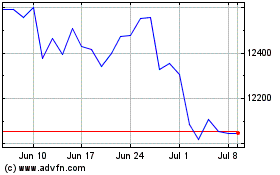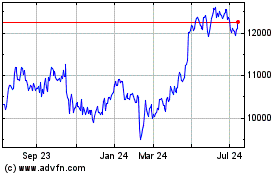By Marcus Walker in Rome and Bojan Pancevski in Berlin
The European Union's economy and vaccination effort have been
mired for months while the U.S. and U.K. race ahead toward recovery
from the pandemic. But the EU's fortunes could change by midyear --
provided that mishaps stop hampering its vaccine supply.
Amid rising social and political pressure, and despite setbacks,
including new safety fears over the vaccine made by AstraZeneca
PLC, European policy makers and analysts are expressing cautious
optimism that the summer could bring a turning point, when vaccine
makers say production will accelerate sufficiently to reopen the
economy before fall.
The hoped-for vaccination breakthrough that experts estimate
could see over 50% of the EU's adult population inoculated by late
July will depend on the seamless supply of shots from multiple
manufacturers, as well as overcoming the logistical and
administrative challenges that have so far plagued the rollout. The
EU's vaccine problems in recent months have ranged from bureaucracy
and the public's hesitancy to key suppliers slashing deliveries due
to manufacturing issues.
The EU expects to receive 360 million doses of Covid-19 vaccines
in the second quarter, a sharp improvement on the 107 million doses
it received in the first quarter. The rising supply is coming
mainly from the vaccine developed by Pfizer Inc. and BioNTech SE,
which is becoming the mainstay of the EU's inoculation campaign.
Nearly 68 million doses of the vaccine were delivered in the first
quarter and 200 million are expected in the second quarter.
"The capacity is rapidly increasing," Thierry Breton, the
European Commissioner overseeing the EU's vaccine strategy, said in
a social-media post on Thursday. Vaccine production in Europe is
more than doubling every month, he said, offering hope for an end
to lockdowns. "I'm afraid we're nowhere near 'normal' yet, but I am
confident that we will find some normality soon."
The U.K.'s experience shows how vaccinating vulnerable groups
can rapidly reduce deaths and hospitalizations from Covid-19 and
pave the way for economic reopening. The British government wants
to lift restrictions gradually between April and June.
That prospect currently seems distant to continental Europeans
suffering the misery of yet another round of lockdowns. France this
week began its third nationwide lockdown of the pandemic while
Germany is considering introducing one.
But an end to the EU's funk is coming into sight. "The gap
between the EU and the U.K. will close, thanks to an impressive
ramp-up of vaccinations in the EU," said Mujtaba Rahman, European
head of risk consulting firm Eurasia Group.
"The political mood in the EU will turn quite quickly as well,
just as it has done in the U.K. on the back of vaccinations," he
said. "All everyone cares about is getting back to normal."
Economists believe the EU economy will probably rebound
powerfully in the second half of this year. Data show much of
Europe's manufacturing industry is recovering, while many service
sectors have found a way to coexist with the persistent
restrictions on daily life.
Europe's economic pain is increasingly concentrated in tourism,
bars, restaurants and other activities that are currently shut or
tightly restricted, but healthy household incomes and pent-up
demand for entertainment mean even those sectors could start to
revive by late summer.
The EU's official goal is to achieve herd immunity by the end of
summer. Although some observers say that target is too optimistic,
forecasters say even inoculating half of the adult population would
probably be enough to reduce Covid deaths and allow for
reopenings.
"Based on what is happening in the U.K., vaccinating roughly 50%
of adults is the threshold you need to get to for governments to
feel comfortable about lifting restrictions," said Andrew
Kenningham, chief European economist at Capital Economics in
London. "We expect it will be a phased process in July, August and
September, depending on the country, the pace of vaccinations and
the prevalence of the virus."
Still, the EU's vaccination delays probably doom Southern
Europe's tourism-heavy economies such as Greece, Spain and Italy to
another lost summer, Mr. Kenningham said--at least until late in
the season.
The risks to a rosier outlook include the threat of mutant virus
variants and further setbacks to vaccine supplies.
Public patience is also wearing thin in many countries after
months of on-again, off-again lockdowns.
Germans' trust in their government's competence has fallen as
Chancellor Angela Merkel has wrestled with the country's 16 states.
Restrictions, loosened in March despite worsening Covid contagion,
could now tighten again.
In France, public anger was roused by media reports of
clandestine dinners among the social and political elites of Paris,
in defiance of social-distancing rules. And in Italy, restaurateurs
fought with police outside the national Parliament in Rome earlier
this week amid growing frustration and hardship in the sector.
Unlike in spring 2020, when tough lockdowns eventually
suppressed Covid infections in most of Europe, months of sacrifices
since late last year have seemingly borne little fruit. Infections,
hospitalizations and deaths have remained stubbornly high in the
EU's major countries.
Health experts partly blame the spread of the more aggressive
U.K. virus variant throughout Europe, dwindling compliance with
social distancing rules by a weary public and the fact that many
people continue to go to their workplaces in factories and
offices.
A year ago, wild animals wandered the streets of deserted
European cities. Now, traffic and commuters are back, albeit at
lower levels than normal. Mobility data show rising movement
despite restrictions.
Workplaces and schools are among the main sources of infection
in Germany, according to the country's disease-control center, the
Robert Koch Institute. Ms. Merkel's government has struggled to
coax businesses to let their staff work from home.
In contrast, Nordic countries such as Norway and Finland have
kept infection rates down thanks partly to widespread working from
home. Denmark, whose fight against the virus has also benefited
from one of Europe's most effective testing regimes, even began to
reopen this week and plans to lift most restrictions by late
May.
Matthew Dalton in Paris contributed to this article.
Write to Marcus Walker at marcus.walker@wsj.com and Bojan
Pancevski at bojan.pancevski@wsj.com
(END) Dow Jones Newswires
April 09, 2021 04:46 ET (08:46 GMT)
Copyright (c) 2021 Dow Jones & Company, Inc.
Astrazeneca (LSE:AZN)
Historical Stock Chart
From Mar 2024 to Apr 2024

Astrazeneca (LSE:AZN)
Historical Stock Chart
From Apr 2023 to Apr 2024
